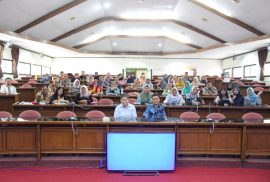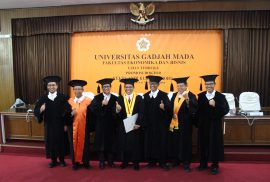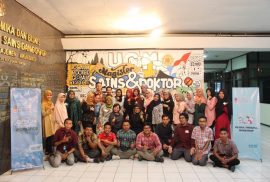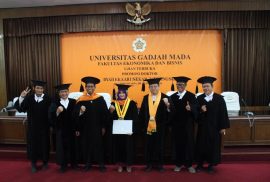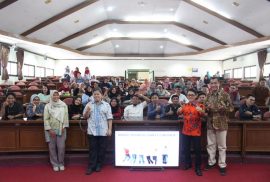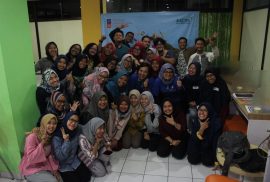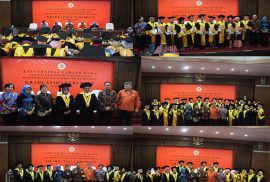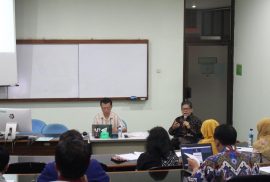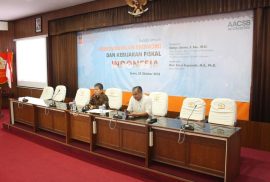Yogyakarta- Monday, November 12th 2018, Master of Science and Doctoral Program, Faculty of Economics and Business, Universitas Gadjah Mada (MD FEB-UGM) conducted a public lecture with the theme: Meta-Analysis of the Effects of Electronic Payment Systems (Digital) on Monetary Economics Magnitude. The public lecture was delivered by Prof. Insukindro, Ph.D., who is a Lecturer in Economics, FEB UGM. The public lecture at the BRI Auditorium 3rd floor, MD FEB Building UGM was opened by Prof. Catur Sugiyanto, M.A., Ph.D. as Director of the Economics Program FEB-UGM.
Yogyakarta – Tuesday, November 6th, 2018 The Master of Science and Doctorate Program, Faculty of Economics and Business, Universitas Gadjah Mada (MD FEB-UGM) organized a public defense doctoral promotion on behalf of Yefta Andi Kus Noegroho, who is a student of the Accounting Doctoral Program at FEB UGM. Dr. Yefta Andi Kus Noegroho, M.Si is a Lecturer at the Faculty of Economics at Satya Wacana Christian University, Salatiga. Dr. Dissertation Yefta Andi Kus Noegroho, M.Si entitled “Moral and Professional Skepticism Auditors” successfully delivered Dr. Yefta Andi Kus Noegroho, M.Si won a doctorate with a Very Satisfying predicate.
Yogyakarta-Friday, November 2th 2018, Master of Science and Doctoral Program, Faculty of Economics and Business, Universitas Gadjah Mada (MD FEB-UGM) again held a design thinking workshop. This design thinking workshop was held for Magister Science Management students who were taking the second semester. Still with the same speaker as the design thinking workshop held last week, Nurul Indarti, Sivilekonom, Cand. Merc., Ph.D and RR. Tur Nastiti, M.Sc., Ph.D. said that the design thinking workshop was a medium to encourage students to think differently, innovatively and critically.
Yogyakarta- Tuesday, October 10th 2018 The Master of Science and Doctorate Program, Faculty of Economics and Business, Gadjah Mada University (MD FEB-UGM) held a public defence. Dr. Dyah Ekaari Sekar Jatiningsih, SE., M.Sc. who is one of the FEB UGM Accounting Doctoral students officially holds the title of Doctor.
Yogyakarta, October 26, 2018. MD FEB UGM held Mind Power and Control Training which was attended by Master and Doctoral students, and several FEB UGM lecturers. This training took place at the BRI Auditorium 3rd floor, MD FEB UGM Building. Denny Farabi, as the training speaker explained that the power of the mind can be used to manage many things in human life.
Yogyakarta – Friday, October 26th 2018, after the success of organizing the first design thinking workshop last May, the Master of Science and Doctoral Program, Faculty of Economics and Business, Gadjah Mada University (MD FEB-UGM) held a design thinking workshop to the second time. Speakers at this workshop were Nurul Indarti, Sivilekonom, Cand. Merc., PhD and RR. Tur Nastiti, M.Sc., PhD. The design thinking workshop held at the 1st Floor Student Lounge of the MD FEB UGM building was then opened directly by the two speakers.
Nurul Indarti, Sivilekonom, Cand. Merc, PhD explained that facilitating the workshop is an attempt to teach and encourage students to think differently and innovatively. The next explanation about the fact about perception difference between fresh graduates and employers. Seventy per cent of new graduates considers that they have critical thinking that is useful in work, but only 30% of employers agree with the statement. Based on these facts, there is still a gap between the ability of new graduates and the expectations of the company (employer). Therefore, improving the ability of critical thinking is important in the current education and design thinking workshop is one solution to hone the ability to think critically.
Participants consisting of students of Master of Science in Economics and Master of Science in Accounting who are still taking the second semester on MD FEB UGM. The facilitator then formed 5 teams, each team consisting of 5-6 people. The formation of a team aims to make students know each other. Each team follows 4 steps in building a thinking design namely, discovery, interpretation, ideation, and experimentation. Later forms of experimentation are to build a prototype that describes the problem and alternative solutions offered.
Hanani, one of the students of the Master of Accounting Science, said that the design thinking learning process is very helpful in coordinating the right brain and left brain in a balanced manner, being able to think later and find solutions. This is in line with the expression of Rozi Aisyah who is a Master of Science in Economics student that through this design thinking workshop, Rozi can know many friends and find new terms in the thinking process.
Tur Nastiti, PhD as the speaker also mentioned some of the benefits of design thinking workshop that is, participants were taught that in the process of solving the problem must understand the problem first which then presents many solutions to the problem. Each participant must also understand that thinking “out of the box” is important, and trying to think laterally.
The workshop ended at 4:30 p.m. and then closed by Nurul Indarti, Sivilokonom, Cand Merc., PhD as Director of the Master of Science Program and Doctor Program of Management. The hope is that the design thinking workshop will continue to be held for each generation in the MD FEB UGM program. (DYR)
Our Company
At GlaxoSmithKline (GSK) we are dedicated to improving the quality of human life by enabling people to do more, feel better, live longer. GSK is one of the world’s leading research based healthcare companies, with over 100,000 employees in 150 countries across our Pharmaceuticals, Vaccines and Consumer Healthcare business.
We are proud of the difference we make and in 2016, FORTUNE Magazine ranked GSK #1 on its list of companies that are changing the world. The ‘Change the World’ list recognises companies that have made significant progress in sustainable, scalable approaches to addressing societal problems as part of their company strategy. Put simply, our focus is on improving access and affordability of medicines, regardless of where people live or their ability to pay.
GSK has been present in Asia for over 50 years and our commitment to the region is strengthened by the establishment of our purpose-built headquarters for Asia. Situated in Singapore, GSK Asia House is a further step in our long-standing strategy to grow and diversify our company – emphasizing the globally balanced business we have built over the years. To better support Asia, we focus on developing talent to improve our ability to make the right
decisions for healthcare professionals, patients and consumers across the region.
At GSK Pharmaceuticals, we are changing the face of healthcare. We are involved in research, development and manufacturing of medicines for a variety of serious and chronic diseases, with market leading products for; Respiratory; Anti-Viral, Central Nervous System, Cardiovascular and Urogenital; Anti-Bacterial; Oncology; and HIV.
GSK Consumer Healthcare has a bold ambition to be the world’s best Fast Moving Consumer Healthcare company. Inspired by a winning culture and a science-led innovation approach, we have developed brands that are built around the needs of the millions of people who go online or walk into pharmacies, supermarkets and market stalls all over the world, every day and choose us first. We have a heritage that goes back more than 160 years, producing some of the world’s best-loved healthcare brands including: Sensodyne, Panadol, Voltaren, Theraflu, Parodontax, Otrivin, Physiogel, Horlicks and Eno.
Please refer to following job description to find our available positions in GSK Indonesia.
Marketing Support Intern
The Role
Become part of the internship program, you will have an opportunity to experience business in consumer healthcare marketing function. You will be assisting Senior Brand Manager in making sure the marketing campaign and projects are on-track and meet deliverables target. This program is designed for 6 months.
Requirements
• Students who in their final year or recently graduated, from any major.
• Able to work in full time basis.
• Fluent in English both oral and written.
• Strong logic and analytical thinking.
• Creative, innovative, and think out of the box.
• Good communication and able to work in a team.
• Highly self-motivated and deliver strong results.
Trade Marketing Intern
The Role
In the role as Intern, you will assist Trade Marketing team on product launch and manage trade marketing activities.
This program is designed for 6 months.
Requirements
• Students who in their final year or recently graduated from Accounting/Finance/Business Administration major with minimum GPA 3.00.
• Able to work in full time basis.
• Fluent in English both oral and written.
• Strong logic and analytical thinking.
• Good communication and able to work in a team.
• Highly self-motivated and deliver strong results.
Commercial Trade Channel Intern
The Role
In the role as Intern, you will assist Head of Commercial Trade Channel with day-to-day operational works and promotional material (i.e, but not limited to administrative tasks of translation and system approval). This program is designed for 6 months.
Requirements
• Students who in their final year or recently graduated, preferably from Pharmacy background with minimum
GPA 3.00.
• Computer and Microsoft Office literate.
• Has good executional skills and well organized.
• Good communication and able to work in a team.
• Good attitude and work ethics.
Application Process
At GSK we value diversity and treat all candidates equally. We aim to create an inclusive workplace where all employees feel engaged, supportive of one another, and know their work makes an important contribution. If you would like to join us in innovating and inspiring changes in the industry, we urge you to apply. You may send
your updated CV to teresa.8.winny@gsk.com and state the title applied as the email subject.
Closing date for applications: 9-11-2018
Wednesday, October 24, 2018. The Master of Science and Doctoral Program, Faculty of Economics and Business, Universitas Gadjah Mada presents a happy moment by officially graduated 52 students. The moment was attended by Dr. Amirullah Setya Hardi as Deputy Dean of Research, Community Service, Cooperation, and Alumni for FEB UGM, Prof. Jogiyanto Hartono as Coordinator of MD FEB UGM Program and Chair of the Accounting Program, Prof. Catur Sugiyanto as chair of Economics Program, Dr. Nurul Indarti as chair of Management Program, and Dr. Rr. Tur Nastiti as manager in Academic, Student, and Cooperation.
Yogyakarta, Wednesday, October 24th 2018, Master of Science and Doctoral Program, Faculty of Economics and Business, Gadjah Mada University (MD FEB-UGM) holds a public lecture on the theme: Fiat Money vs. Virtual Money and Its Effects on Monetary Stability and Financial Stability. The public lecture was delivered by Prof. Insukindro, Ph.D., who is a Lecturer in Economics, Faculty of Economics and Business UGM. The public lecture took place in Bakrie Room, 2nd Floor, the MD Building of FEB UGM was opened by Prof. Dr Catur Sugiyanto as Director of the Economics Program.
As an introduction, Prof. Insukindro, PhD in college generally said that digital-based economics is a digitalisation of information and communication technology infrastructure in the economic field. The concept of digital-based economics is often seen as feasible to explain the influence of communication technology infrastructure or the interaction between the development of innovation and technological advances on micro and macroeconomics. One form of digital economy in Indonesia is BI-RTGS (BI-Real Time Gross Settlement) which is an electronic transfer system between participants in rupiah and the settlement is done in real time.
The typology that distinguishes between fiat money and digital/virtual money is in several ways. Fiat money has an institution/authority, centralization, varied forms and not on behalf of, can be reached globally but needs to be converted for use in certain countries, and their use can be from individuals to individuals or electronically. Digital / virtual money does not have a financial institution/authority, is centralized or decentralized, its form varies not on behalf of (for example bitcoin), can reach globally but cannot be widely used or accepted such as fiat money, and its use from individuals to individuals and electronics (bitcoin, e-gold exchange).
In Indonesia, the use of digital money is only limited as an investment. Countries that have fully used digital money in the investment process and transactions are Venezuela and Ireland. Besides being limited by the Act, this is because there are still many risks when using digital money such as there is no protection for consumers, vulnerable crime, taxes, and many other risks. However, as long as it is still in information technology, digital money is still in demand in Indonesia, although only limited to investment. (DYR)
Yogyakarta, October 22th 2018, Master of Science and Doctoral Program, Faculty of Economics and Business, Gadjah Mada University (MD FEB UGM) conducted a public lecture entitled “Economic Development and Fiscal Policy in Indonesia to Realize Welfare”. The public lecture took place at the BRI Auditorium on the 3rd floor of MD FEB-UGM building hosted by Wahyu Utomo, S. Sos., M.Sc. as the Head of Central State Budget and Fiscal Policy Agency, Ministry of Finance of the Republic of Indonesia. The public lecture was moderated by Prof. Catur Sugiyanto, M.A., Ph.D as Director of the Economics Program MD FEB-UGM.
The fiscal policy strategy for realizing prosperity is through a healthy and sustainable State Budget (APBN), strengthening the main functions of fiscal policy, and sustainable development. Through a healthy APBN, it will encourage three main functions of fiscal policy to run optimally, which in turn can sustain sustainable development in order to realize equitable prosperity.
Wahyu Utomo, S. Sos., M.Sc. in his session generally said that the direction and strategy of Indonesia’s fiscal policy in 2045 had the potential to become a developed country. This can be realized with the prerequisites for infrastructure readiness, quality of human resources, technology readiness, government institutions, regional spatial planning, and APBN must be good. Then in the medium term, the direction and strategy of fiscal policy are towards a just, prosperous, and independent Indonesia by strengthening fiscal management to encourage investment and competitiveness of the nation. In an effort to respond to fiscal challenges, several strategic policies were carried out in 2019, namely revenue optimization, targeted and measurable expansion, infrastructure development, improving the quality of education, mitigating fiscal risks, improving the quality of public services, social protection programs, and improving the quality of health.
At the end of the session, Wahyu Utomo, S. Sos., M.Sc. restated that the Indonesian state budget must be healthy which will then have an impact on improving the welfare of the community. The general lecture session was closed with a question and answer with the audience. (DYR)

